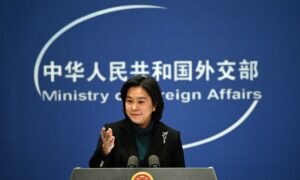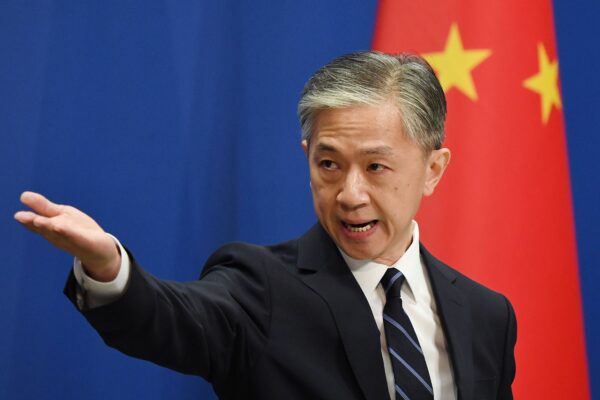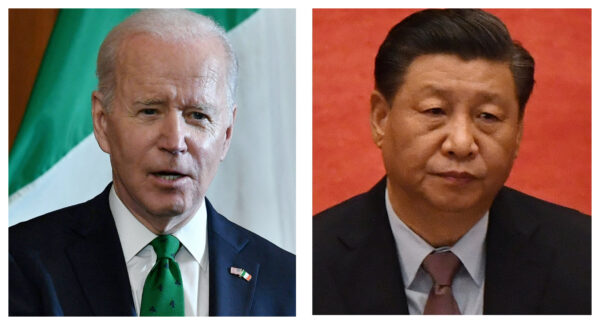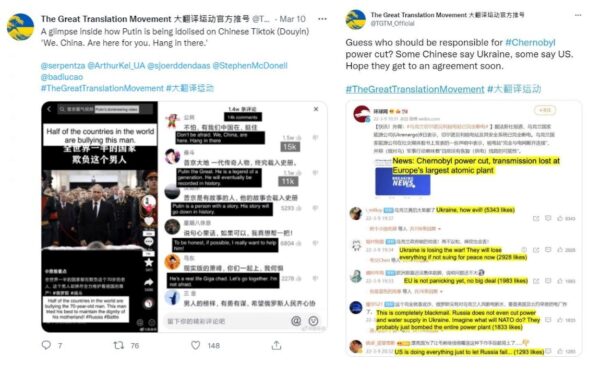CCP’s Official Diplomatic Statement Translation Can Be Misleading: Study
A new study shows that the official translation of communist China’s diplomatic statements may be sub-optimal and create misunderstandings, potentially leading to poor or even calamitous foreign policy responses.According to Corey Lee Bell, a project and research officer at the University of Technology Sydney’s Australia-China Relations Institute, The People’s Republic of China’s Ministry of Foreign Affairs (MFA) translations are of inconsistent quality, and may inadvertently—sometimes perhaps intentionally—convey different messages from the Chinese source. Bell, in his research entitled ‘Translators and Traitors’: What to be wary of when reading translations of PRC diplomatic/foreign affairs statements, also argued that all translations from the MFA should ideally be substituted by professional translations where possible. “One often cited source of English translations of the PRC’s MFA statements is the MFA’s official website. While it has become relatively comprehensive and prompt in its production of translations, its work is often described among professional translators in the PRC through the idiom ‘creating a cart behind closed doors’… i.e., a translation divorced from proper scrutiny or a translation that did not undergo a thorough quality review by a qualified first language speaker’,” Bell said. English Translation Can be Stronger or Less Assertive than Chinese Source Bell argues that there are often times when the MFA’s English translation is less strong in tone than the Chinese source, with a recent example being a response from the MFA spokesperson to the United Nations Human Rights Office’s report—published on Aug. 31—on the Chinese regime’s treatment of Uyghurs in the Xinjiang region. He argues that this may reflect “the strategic use of discrepancies between a Chinese source and an official MFA English translation.” Chinese Foreign Ministry spokesman Wang Wenbin takes a question during a daily Foreign Ministry briefing in Beijing on July 24, 2020. (Greg Baker/AFP via Getty Images) On Aug. 11, right before the release of the report, an MFA spokesperson was asked by a China News Service representative for his opinion on a report compiled by the ‘China Society for Human Rights Studies.’ Wang’s reply included “three serious crimes” the United States has “committed” in the Middle East and surrounding areas. “The first ‘crime/violation’, according to the MFA’s translation of the spokesperson’s remarks, was that ‘the U.S. has launched wars that damaged people’s right to life and survival.’ The original Chinese, however, was stronger in tone, stating that America had ‘wantonly launched’ (肆意发动 )these wars,” Bell said. “The English translation also said that America ‘just cannot deflect responsibility for starting wars.’ This is a polite translation of the archaic/formal Chinese phrase (难辞其咎), which generally conveys the indefensibility of past actions, akin to the phrase ‘can hardly absolve oneself of blame/responsibility.’” There are also cases in which English MFA translation is stronger in tone than the Chinese original, many involving the translation of Chinese idioms, which are often in the form of archaic four-letter word phrases, conveying “abstract ideas through depictions of events and concrete objects.” The most recent example is the widely cited official translation of Chinese Communist Party (CCP) leader Xi Jinping’s “Those who play with fire will perish by it” when attempting to warn U.S. President Joe Biden about Taiwan on a phone call in July, which was translated from a common Chinese idiom (玩火自焚). “While ‘perish’ can be justified in the English translation, it is not necessary to capture the figurative sense of the idiom, which could simply be translated as ‘those who play with fire will get burned,’ Bell argued. (L) President Joe Biden speaks during the annual St. Patrick’s Day luncheon on Capitol Hill in Washington, on March 17, 2022. (Nicholas Kamm/AFP via Getty Images); (R) Chinese leader Xi Jinping in Beijing, on March 4, 2021. (Leo Ramirez/AFP via Getty Images) Another famous example is a translation of a phrase from Xi Jinping’s speech marking the centenary anniversary of the CCP in mid-2021, where he declared that the Chinese people would not allow any foreign forces to bully, oppress or enslave the country and any who dared would “have their heads bashed bloody against a Great Wall of steel forged by over 1.4 billion Chinese people.” The phrase “heads bashed bloody” sparked controversy outside China and was featured in the headline of an article by The Washington Post. Bell gave his own translation for reference: “Anyone that vainly attempts to do so will smash against the great steel wall forged by the flesh and blood of over 1.4 billion Chinese people49 and will fail dismally/have their noses bloodied (lit., ‘smash against the great steel wall… [so hard] that their heads will be cut open and bloodied’).” MFA Translation Can Be Supplementary Source The

A new study shows that the official translation of communist China’s diplomatic statements may be sub-optimal and create misunderstandings, potentially leading to poor or even calamitous foreign policy responses.
According to Corey Lee Bell, a project and research officer at the University of Technology Sydney’s Australia-China Relations Institute, The People’s Republic of China’s Ministry of Foreign Affairs (MFA) translations are of inconsistent quality, and may inadvertently—sometimes perhaps intentionally—convey different messages from the Chinese source.
Bell, in his research entitled ‘Translators and Traitors’: What to be wary of when reading translations of PRC diplomatic/foreign affairs statements, also argued that all translations from the MFA should ideally be substituted by professional translations where possible.
“One often cited source of English translations of the PRC’s MFA statements is the MFA’s official website. While it has become relatively comprehensive and prompt in its production of translations, its work is often described among professional translators in the PRC through the idiom ‘creating a cart behind closed doors’… i.e., a translation divorced from proper scrutiny or a translation that did not undergo a thorough quality review by a qualified first language speaker’,” Bell said.
English Translation Can be Stronger or Less Assertive than Chinese Source
Bell argues that there are often times when the MFA’s English translation is less strong in tone than the Chinese source, with a recent example being a response from the MFA spokesperson to the United Nations Human Rights Office’s report—published on Aug. 31—on the Chinese regime’s treatment of Uyghurs in the Xinjiang region. He argues that this may reflect “the strategic use of discrepancies between a Chinese source and an official MFA English translation.”

On Aug. 11, right before the release of the report, an MFA spokesperson was asked by a China News Service representative for his opinion on a report compiled by the ‘China Society for Human Rights Studies.’ Wang’s reply included “three serious crimes” the United States has “committed” in the Middle East and surrounding areas.
“The first ‘crime/violation’, according to the MFA’s translation of the spokesperson’s remarks, was that ‘the U.S. has launched wars that damaged people’s right to life and survival.’ The original Chinese, however, was stronger in tone, stating that America had ‘wantonly launched’ (肆意发动 )these wars,” Bell said.
“The English translation also said that America ‘just cannot deflect responsibility for starting wars.’ This is a polite translation of the archaic/formal Chinese phrase (难辞其咎), which generally conveys the indefensibility of past actions, akin to the phrase ‘can hardly absolve oneself of blame/responsibility.’”
There are also cases in which English MFA translation is stronger in tone than the Chinese original, many involving the translation of Chinese idioms, which are often in the form of archaic four-letter word phrases, conveying “abstract ideas through depictions of events and concrete objects.”
The most recent example is the widely cited official translation of Chinese Communist Party (CCP) leader Xi Jinping’s “Those who play with fire will perish by it” when attempting to warn U.S. President Joe Biden about Taiwan on a phone call in July, which was translated from a common Chinese idiom (玩火自焚).
“While ‘perish’ can be justified in the English translation, it is not necessary to capture the figurative sense of the idiom, which could simply be translated as ‘those who play with fire will get burned,’ Bell argued.

Another famous example is a translation of a phrase from Xi Jinping’s speech marking the centenary anniversary of the CCP in mid-2021, where he declared that the Chinese people would not allow any foreign forces to bully, oppress or enslave the country and any who dared would “have their heads bashed bloody against a Great Wall of steel forged by over 1.4 billion Chinese people.”
The phrase “heads bashed bloody” sparked controversy outside China and was featured in the headline of an article by The Washington Post.
Bell gave his own translation for reference: “Anyone that vainly attempts to do so will smash against the great steel wall forged by the flesh and blood of over 1.4 billion Chinese people49 and will fail dismally/have their noses bloodied (lit., ‘smash against the great steel wall… [so hard] that their heads will be cut open and bloodied’).”
MFA Translation Can Be Supplementary Source

The author also noted the Great Translation Movement, which is an online translation campaign by anti-communist activists to expose the “hidden and less savoury elements of PRC political commentary.”
Despite the inadvertent or intentional discrepancies, Bell believes that MFA translations can sometimes be an important supplementary source to accurate translations of Chinese source texts.
“Since they are less directed at domestic image management, they may better reflect the tenor/substance of official diplomatic representations,” he said.












